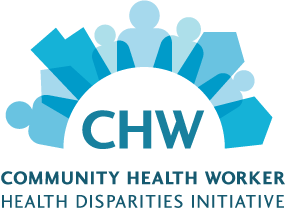Central Massachusetts Area Health Education Center (CMAHEC)
CMAHEC Engaged CHW Employers to Enhance Recruitment
CMAHEC educated Community Health Workers’ (CHWs) employers about the importance of the CHWs’ participation in this project. The project promoted the value of the CHW training as an opportunity to advance CHWs’ professional development, increase local health education capacity and resources, strengthen the heart health education provided by health care teams, support the heart health needs of African American and Hispanic/Latino community members, and address health disparities in their communities.
Location:
Worcester, Boston, and Springfield/Holyoke, MA
Intended Population:
African American and Hispanic/Latino communities
Curricula Used:
With Every Heartbeat Is Life: A Community Health Worker’s Manual for African Americans and Your Heart, Your Life: A Community Health Worker’s Manual for the Hispanic Community
Key Partners:
Massachusetts Association of Community Health Workers, Massachusetts Department of Public Health’s Offices of Community Health Workers and Heart Disease and Stroke Prevention and Control Programs, and Boston Public Health Commission’s Community Health Education Center.
CVD Burden:
Data from the Massachusetts Department of Public Health and the Massachusetts Children’s Health Insurance Program indicated striking disparities in mortality and hospitalization related to cardiovascular disease (CVD), heart attack, and stroke among certain residents of the state, particularly those in western Massachusetts. Worcester, Boston, and Springfield/Holyoke were selected as "epicenters" of the project, because these cities and the counties in which they are located had some of the worst health outcomes in the state.1
Implementation:
CMAHEC relied on a team training approach to train 67 Community Health Workers (CHWs). Training sessions were co-taught by CHWs and expert trainers who had previous experiences in heart health or training, for example. To tailor the training to the needs of the area’s CHWs and their communities, CMAHEC merged the NHLBI&rsqou;s African American and Hispanic/Latino curricula to create a project that reflected the needs and priorities of both groups. CHWs were trained with these curricula and also used the curricula to deliver heart health education to Hispanic/Latino and African American adults throughout the state.
CMAHEC took various steps to support their CHWs:
- Provided ongoing support and monitoring of newly trained CHWs through learning collaboratives held every 2 months to ascertain CHWs’ support and training needs. Support and continuing education were provided both in person and online.
- Gathered ongoing feedback from CHWs to assess the effectiveness of its training strategies.
- Identified and recommended adaptations for future training and support activities.
Evaluation:
CMAHEC used the NHLBI’s evaluation forms included in the curricula to assess changes in the heart health knowledge, attitudes, and behaviors of the CHWs and community members. In addition, through CHW group conference calls and in-person networking sessions, as well as with individualized phone calls and in-person meetings, CMAHEC collected feedback about the curriculum content and materials on how CHWs use them in the community. Focus groups with community members complemented the NHLBI evaluation forms in further exploring behavior change and attitudes.
1 University of Wisconsin Population Health Institute. (2011). County Health Rankings: Mobilizing Action Toward Community Health, 2011 Massachusetts.
Last Updated: June 2014






